insert_linkIs it Okay to Block Ads?
Whether or not you should block ads (advertisements) is a considerably controversial question, with swarms of arguments for each side. I, myself, use an advertisement blocker when browsing the deep streets of the Internet quite happily, in fact.
Keep in mind that I indeed run this blog and note how I do not display tasteless banner ads.
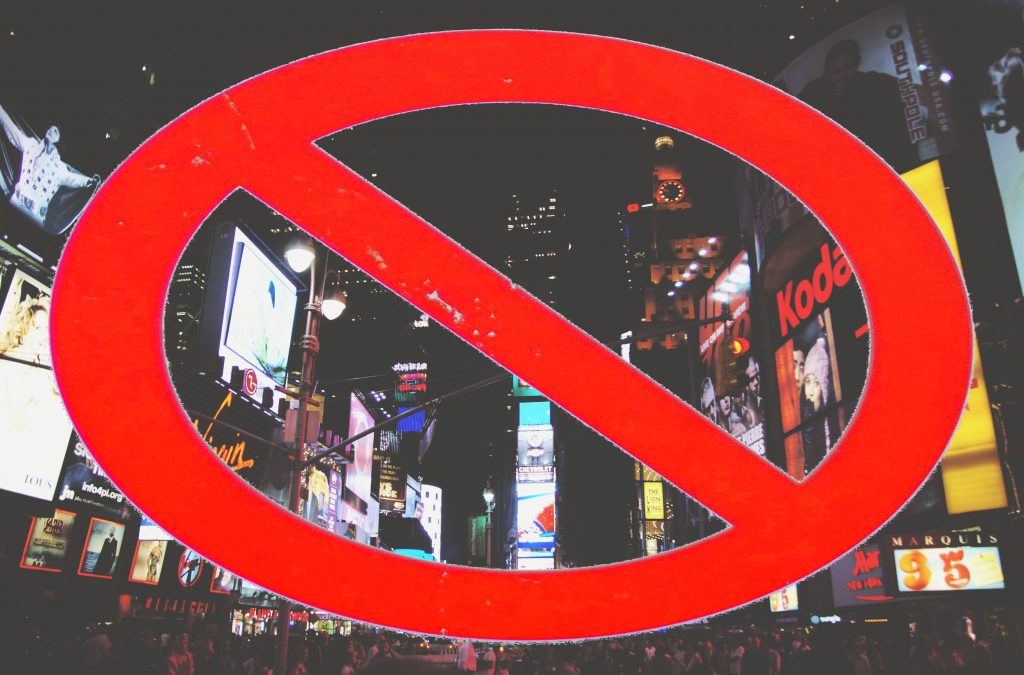
Of course, not everybody thinks like me, which is why I’m supplying the reasons for why you should block ads. This is in face of the arguments for not blocking ads, thus I will attempt to directly oppose them.
But why would you not block ads online?
Certainly, this is a thoughtful question with some solid answers to it, too. To exemplify, here are a few reasonable arguments against the usage of ad blockers, and they all relate to revenue.
insert_linkThe Website Needs to Make Money!
As I am sure you have already observed, the overwhelming majority of websites on the Internet are free to use. As a result, many websites have to acquire money without directly asking for it from the user. How exactly would one achieve that?
Clearly, advertising through website banners and videos etc seems to be a substantially popular solution to this problem; the user gets to use the website for free, meanwhile, the website owners swim in their pools of revenue.
However, this money does not come from a magical tree somewhere in a questionable woodland. Rather, the 3rd-party advertiser pays to be featured on a website. This is not a one-way deal, though, since the advertiser does get what it paid for (probably).
In order to receive adequate revenue, displayers of ads can charge for impressions (the advertisement being viewed) and clicks. Typically, the cost per click is greater than that for impression, yet still fairly low. (This is because only a small proportion of users go ahead and buy the featured product after viewing the advertisement.)
From this, people against those who block ads spawn their most powerful argument: even if you would not click on ads without blocking them, you continue supporting the website through impressions.
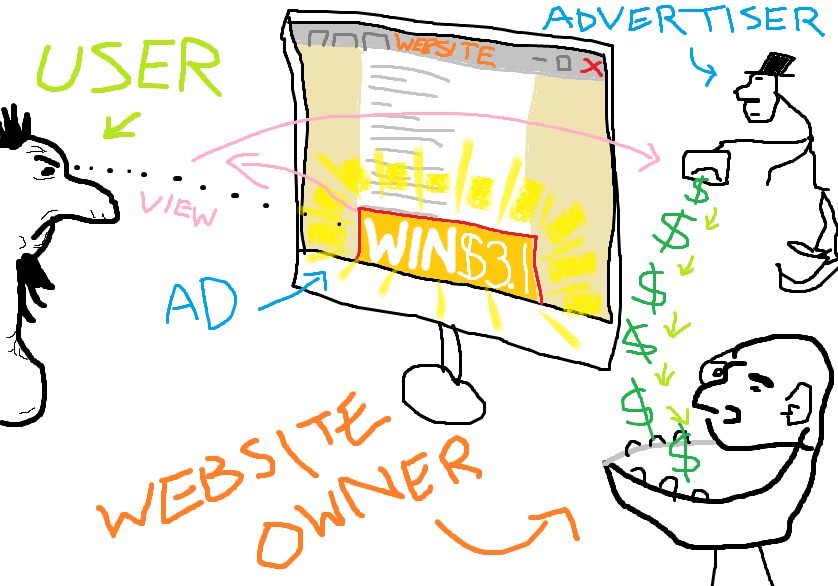
People who block ads could be seen as leeches—by taking from the website they enjoy without giving back. Now, unlike the story of advertisers, this is truly a one-way relationship; one in which the website is more likely to suffer.
insert_linkWhat Are the Consequences of People Who Block Ads?
All right then—so what? What if you did not supply ad-revenue to websites? Here, the argument is that the future of these websites would be compromised, leading to numerous consequences.
Moreover, these said consequences may be as minor as degradation in the website’s quality or as major as the website closing shop. Alternatively, one could be faced with the less desirable reality of having to pay to use the website. Otherwise, the website would not be able to sustainably maintain itself.
Also, think of the people who provide your content, since an unignorable proportion of their salary could come from advertising.
insert_linkBrands Want to Spread Awareness of Their Product
Next, a far less convincing argument for why you might not want to block ads.
The core purpose of advertisements is to—you guessed it—spreading awareness of a product or service and selling it. With all of these people blocking ads, the audience for a given ad shrinks massively.
Normally, this is not a tremendous issue, seeing that websites usually do not charge for not displaying a company’s advertisement. Furthermore, if you are someone like me, you would simply ignore the ad wholly. Of course, no good for the advertiser.

However, the issue arises when people who block ads are statistically more likely to give their money for the product. Also, seeing the product advertised can make someone more likely to buy from that brand in the future. This is due to their previous exposure to that brand, and an assumed reputation for that reason.
insert_linkYou Might Stumble Across Something You Want or Need
Another argument for why you shouldn’t block ads is that, by doing so, you cut yourself off from potential opportunities. That is to say, you might come across something you actually like or need.
Moments like this could help you tremendously if you haven’t found that ideal product yet. Equally, there might be a product that you need even though you didn’t know you needed it before the moment.
insert_linkCounter-Argument: Why You Should Block Ads
That being said, there is plenty of quality reasons why I like to block ads everywhere—using an ad-blocker.
Before that, however, let me make myself clear: I still believe that content creators and websites deserve to be compensated when providing free content. I do this myself (you’re reading these words at no cost), so obviously I am in favour of absolute justice.
insert_link1) The Exquisitely Enhanced Experience
Enjoy an exuberant web-browsing experience free of intrusive, distracting ads.
This is potentially the number-one reason why anyone would want to take the leap to block ads. No doubt about that.
While most advertisements might be distracting, some are—put simply—absolutely no-turning-back intrusive. For example, these might include pop-up ads, YouTube video ads, and huge banners before the content. The latter of the group necessitates that you scroll for 3.14 miles until reaching the real deal.
Therefore, intrusive ads can truly damage the user’s experience and make them want to block ads.
I Recommend: How to Beautifully Customise Taskbar Appearance
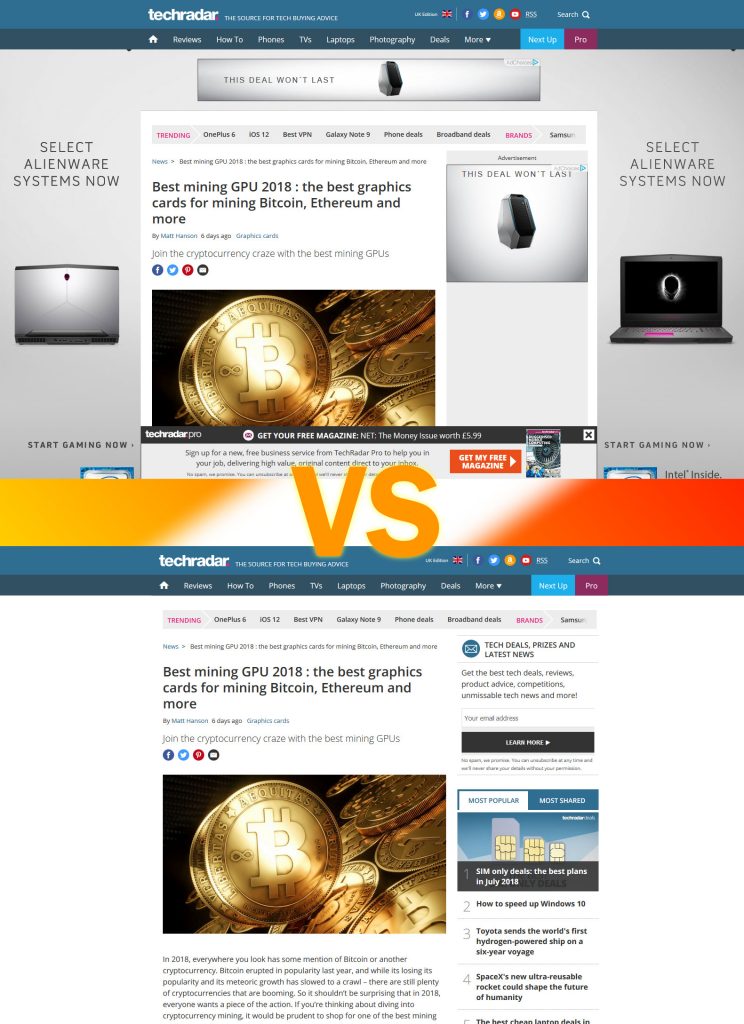
insert_linkWhy Block Ads Even If They Are Non-Intrusive
Additionally, something as minor as a narrow banner ad sitting at the bottom of the screen sets my alarm off. In fact, even if it is in the sidebar, I will inevitably feel the anger burning up inside of me.
But why? After all, they are not of the intrusive breed of advertisement.
Well, to answer that, they completely distract me from the website’s content—by merely standing out; remember that the purpose of an advertisement is to grab your attention.
Most—if not, all—of the time, banner ads don’t blend in with the website, hence the messy, distasteful aesthetic. This involves conflicting colours as well as mismatched imagery, text styles, and design. For this reason, advertisements can be the most significant factor detracting from a website’s experience.
For instance, even an ugly 1990’s style website is more enjoyable when it is not clouded by ads.

An additional technique used by advertisers to seize your financially valuable attention is the utilisation of animations. For example, whereas the rest of the site is relatively calm and tranquil, that flashy advertisement yells at the top of its digital voice.
However, once you block ads, the user experience becomes better tenfold across the entire web.
Now, you don’t have those annoying, out-of-place banner ads thieving your pocket of attention; you are guaranteed to experience an overall clean-looking website. For you see, that is how the websites were designed to look—sensical.
insert_link2) I Don’t Pay Attention to Ads Anyway
Although to block ads there remains the issue of no impressions, I stand by this reason.
insert_link“I Don’t Click on Ads”
Indeed, this reason can easily be argued against by saying even impressions generate revenue for websites. Thus, I shall take this on from a completely unique perspective: that of the user.
As far as the user is concerned, why do they need to see ads if they never listen to them? In truth, I feel the user has the right to block ads if they don’t find any value in them.
To iterate, this approach is considered selfish by some, since ads allow you to give back even without clicking them. By contrast, my focus is on the user experience. So, if they are virtually needless, you might as well block ads—the visual improvements are undoubtedly worth it.
insert_linkI Won’t Be Buying into the Brand’s Products or Services
On the other hand of things, people who don’t block ads yet ignore them aren’t being saviours. In fact, they are hurting the advertising brands, meanwhile, the website owners are laughing.
This is because advertising brands have to pay for you viewing their ads, but they get nothing out of it; you won’t subsequently buy the product as a result of the advertisement.
Moreover, you lower the conversion rate (proportion of people buying the product after seeing the ad). Hence, it is less profitable for the advertiser.
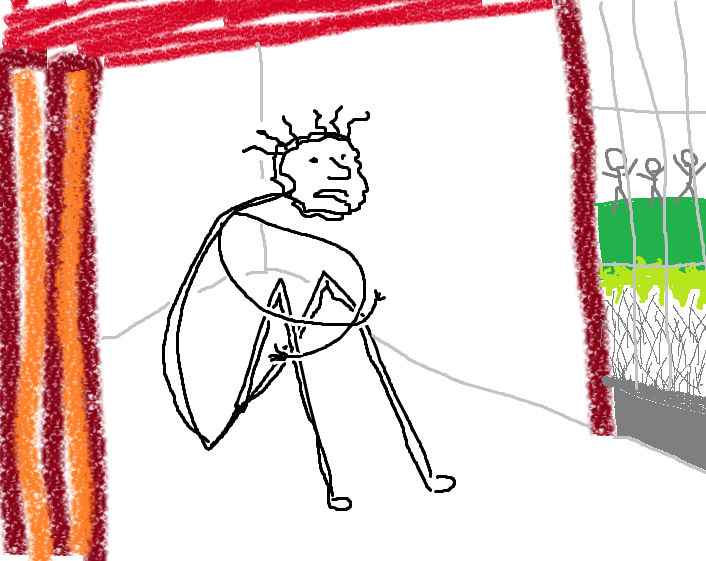
Also, banner-ad services such as Google AdSense usually display generic advertisements. Therefore, the advertisement would mostly be untargeted, irrelevant to the content, and in misalignment with your interests.
Unideal for both the advertiser and yourself, this leads to the advertisement being a mere distraction. In other words, you will not be buying into the product due to the ad nor helping spread awareness. Perhaps this is what would drive you to block ads and live life happy and fulfilled.
Although, it is worth noting that many advertisers are probably larger than the website and can afford the extra impressions. Not to mention, they will make some juicy profit from selling their own products—something countless free websites don’t do.
insert_link3) I Don’t Favour Being Tracked Wherever I Go
Your privacy is a real thing, but so is the Zuckerberg lizard.
This is perhaps the strongest reason I have to block ads wherever I go.
As a matter of fact, ads aren’t just all about revenue and user experience. Conversely, they may contain some shape-shifting evil lizards wanting to Zuck your data away.
Scarily enough, ads will never hesitate to track you due to the fact that doing so is more profitable. Like I mentioned earlier, ads are generally quite generic and untargeted. However, you shouldn’t be fooled into thinking the process of displaying ads is completely random.
Unlike website analytics, ads can track you as you navigate throughout the Internet of advertisements. Now just imagine the volume of years of sheer data about you built up by these nefarious ads. Trust me, there is certainly some strong privacy-related reasoning to block ads online.
Good stuff: What is The Best Way to Search the Internet?

Furthermore, the data collected about you is put to profitable use by advertisers; they ensure to show the most relevant advertisement based on age, gender, demographics, interests, and behaviour. To emphasise, this is a plethora of information available at the crafty, lizard finger-tips of advertisers.
They, in essence, build up a detailed profile of you without you knowing about this. This is something you would really not want to release publicly if you ever saw it.
What’s more, tracking data is often sold to third parties. And who knows what they would ever do with such power…
insert_link4) You Can Always Whitelist Websites
Why not enjoy surfing the Internet while supporting websites you enjoy?
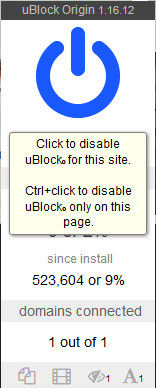
It’s plausible that you could be morally torn between two options: supporting the websites you visit with ad revenue or browsing the Internet distraction-free. In this case, it is always good to know that there is a cosy in-between.
That is, if you block ads on the Internet with an ad blocker, you always have the option to effortlessly whitelist a site. For example, if there is a particular blog you find value in, that website can be whitelisted to allow ads. Hence, the majority of the Internet can be navigated ad-free, but you continue supporting worthwhile websites.
Moreover, some web pages might either partially or completely break due to the ad blocker. Accordingly, one can merely stop blocking ads for that webpage and everything will be fine. It always works out in your favour.
insert_link5) It’s the Website’s Problem
It is not just the user who has the freedom to do what they want.
Here is surely a very controversial supporting argument that you can block ads freely and morally.
If the website is suffering because of people who block ads, that is their problem, not yours. You have the freedom to block advertisements but doing so can never be immoral.
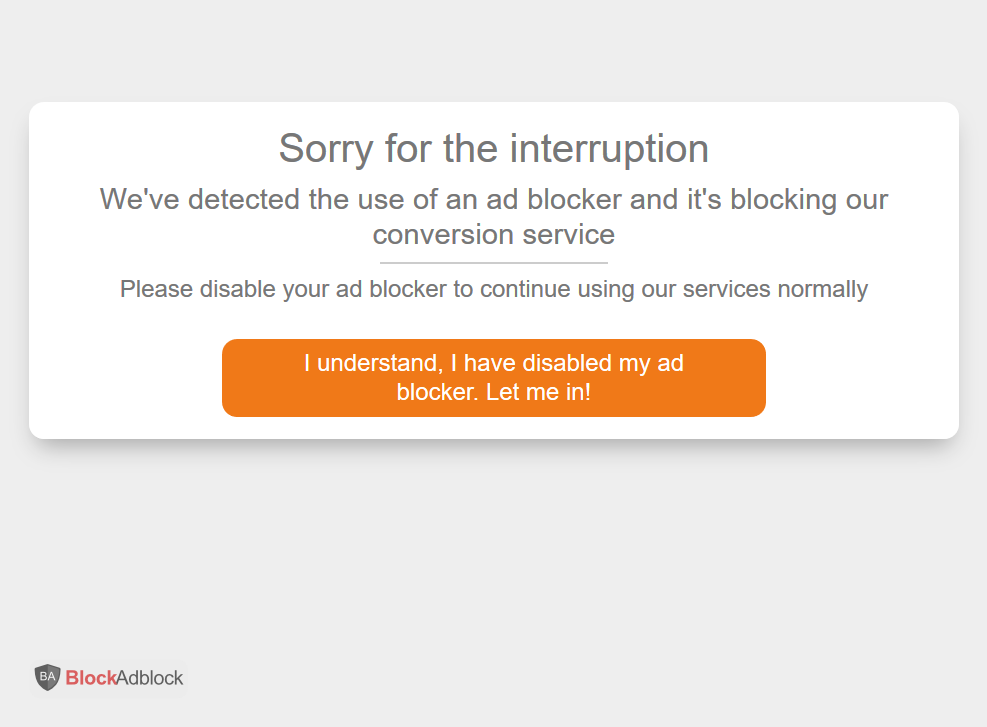
Why would this be so? Well, you have also got to remember that the website has free will to do what it wants too. Therefore, they could easily start charging for their website if they thought that would be the best course of action.
My problem is when websites complain that you aren’t using an ad blocker. Fair enough, they may block the access of people who block ads to their site, because they have that freedom. Nevertheless, they should be focusing on stellar user experience.
If a user finds discomfort in an ad-populated experience, by all means, let it happen; in fact, there are many ways to provide a website for free without ads while being more profitable.
insert_linkSome Alternative Profit-Making Techniques
One of the most notable methods is using affiliate programmes, which entails recommending products or services and earning a commission. In addition, one could go for sponsorships—another splendid way to attain some quality revenue. Threaded into the main content, these methods—done properly, that is—are not blocked by ad blockers.
It is also a respectable business model to only recommend products you trust, not random ones found on advertisements.
In actuality, if an online business wants to ensure a stable, promising future, they must be diverse. To be concise, they should not be relying on a sole source of revenue. The Internet is adaptable, and we are not endangering it by blocking ads.
I believe in more creative ways to make a profit.
insert_linkGet Blocking Right Now
From this, I think it is rather evident that I actually encourage you to block ads. Since I care about the user’s experience (and I hate ads myself), I would never display ugly banner ads here.

As a result, I encourage that, if you want, learn how to support me. To clarify, there is no need to donate or disable your ad blocker—yay!
I use uBlock Origin because it is immensely effective as well as lightweight. As a bonus, it also blocks trackers to make sure you are safe and secure whilst browsing the Internet.
Be wary, though; as the browser extension is open-source, there are similar (best avoided) extensions using the name “uBlock”. These are probably heavily out-of-date and contain unwanted malware or trackers, defeating the purpose of installing an extension like that.
Okay, so you have done that, but there is no need to stop there. For instance, you can go that extra few clicks in order to maximise your online privacy. If you want, you can install Ghostery or Privacy Badger for blocking even more trackers.
And while we are talking about privacy, conceal your identity further—stay anonymous—with IPVanish or NordVPN. This is how to fight against spying, hacking, and bypass censorship using an encrypted Internet connection without compromising speed.
Get really nice and cosy with my recent article: How to Spot a Scam in 3 Simple Words


